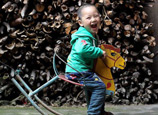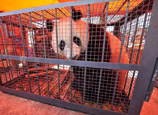
"I took pictures with them for free, and they also teach horse riding," a tourist surnamed Zhu, who brought an online group purchase coupon for 29 yuan, told the Global Times.
However, according to the People's Police Law, police officers are not allowed to engage in business activities. This casts a shadow over the unit's involvement in tourism, and raises questions over how its profits are used.
"The process used to establish the unit is now hard to uncover, but its current operations should be supervised. For example, their uniform was 'specially approved' by the MPS, which is by definition against regulations as the law does not make exceptions," Han said.
Expensive animals
The city's public security bureau made a statement Monday about the issue that most concerns taxpayers: money.
"Currently, the unit has 65 policewomen and 100 horses. The horses are retired British thoroughbred racehorses donated by the Hong Kong Jockey Club (HKJC), and each horse costs around 2,500 yuan ($407.25) per month, including feed, supplies and medicine provided under strict supervision," said the statement from the bureau. In contrast, the monthly salary of the policewomen ranges from just 1,800 to 3,800 yuan.
The HKJC confirmed the donation, and said that it also provides follow-up medical and health care support to the retired racehorses.
A Shenzhen-based horse ranch owner surnamed Chen told the Global Times that 2,500 yuan was the very least it would cost to raise a healthy horse using standard feed.
However, not everyone is convinced. A breeder surnamed Wu at the Knight Union Equestrian Club in Beijing told the Global Times it costs at least 3,500 yuan or up to 7,000 with labor expenses each month to raise a thoroughbred.
In addition, transport fees for the donated horses from Hong Kong came to more than a million yuan, the Beijing News reported. The bureau did not respond queries regarding these costs as of press time.

















 Learning to be a perfect lady proves fruitful
Learning to be a perfect lady proves fruitful


![]()
